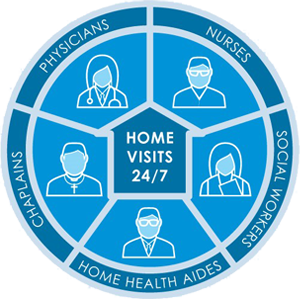
Palliative care
Palliative care helps people with management of serious illnesses, which can help to reduce trips to the emergency room or hospital.
How can palliative care help?
Studies show palliative care can:
- Reduce physical discomfort
- Improve quality of life
- Make living with a serious illness easier
- Provide support for family and/or caregivers
- Offer support for both persons with serious illnesses and those who help care for them
Blue Shield's home-based palliative care program
What services are covered?
- Treatment decision and support
- Care plan development and shared decision making
- Home-based palliative care visits - in person and via video conferencing
- Medication management and reconciliation
- Psychosocial support for mental, emotional, social, and spiritual well-being
- 24/7 access to patient help and support
- Caregiver support
Where are these services delivered?
Throughout California wherever the person needs or wants them such as:
- At home
- Via phone or video
Who is on the palliative care team?
The team consists of specially trained:
- Doctors
- Nurses
- Social workers
- Home health aides
- Spiritual counselors
For more information see the palliative care infographic (PDF, 90 KB) and fast facts sheet (PDF, 76 KB).

Who is eligible for palliative care?
Palliative care is a standard service available to all members with Blue Shield of California primary coverage, with the exception of FEP PPO, Medicare Supplement, Shared Advantage, and Cal MediConnect.
Palliative care services are in addition to a member's other medical care at no additional charge.
Palliative care is considered a primary Blue Shield of California service. Any member can self-refer, and no prior authorization is required.
Referrals can also come from:
- Family members
- Case management (Blue Shield and others)
- Providers (such as Primary Care Providers and specialists)
- Hospital discharge planners
Advanced care planning conversations
Ariadne Labs developed the What Matters to Me Workbook (PDF, 264 KB) in collaboration with The Conversation Project. It is designed to help people with a serious illness get ready to talk to their health care team about what is most important to them.
Providers also have access to the Serious Illness Conversation Guide (PDF, 134 KB) to help them speak with patients about their goals and values.
Have a member you would like to refer to the palliative care program? Download the Eligibility Screening Tool (PDF, 271 KB), complete the form, and email it to the palliative care team at BSCPalliativeCare@blueshieldca.com.
Palliative Care training & forms
Referring Patients to Home-Based Palliative Care
This webinar describes how providers can refer qualified patients to Blue Shield’s Home-Based Palliative Care (HBPC) program. The session covers HBPC patient eligibility requirements, the referral process, HBPC services provided as part of the program, and resources available to support referring providers.
Recorded webinar (48 min)


Home-Based Palliative Care Program Overview for Servicing Providers
This webinar describes Blue Shield’s home-based palliative care program from the perspective of a servicing provider. Topics included how to qualify and enroll patients, how to code and bill for hassle-free payment, and more.
Recorded webinar (48 min)

Use the tool below to qualify Blue Shield members for the Home-Based Palliative Care (HBPC) Program. Only members meeting the criteria outlined in this tool can be enrolled in the program.

This one-page job aid captures key steps that servicing providers should follow when assessing, enrolling, and caring for members in the HBPC program.

The support documents below are provided to help servicing providers meet program requirements.



